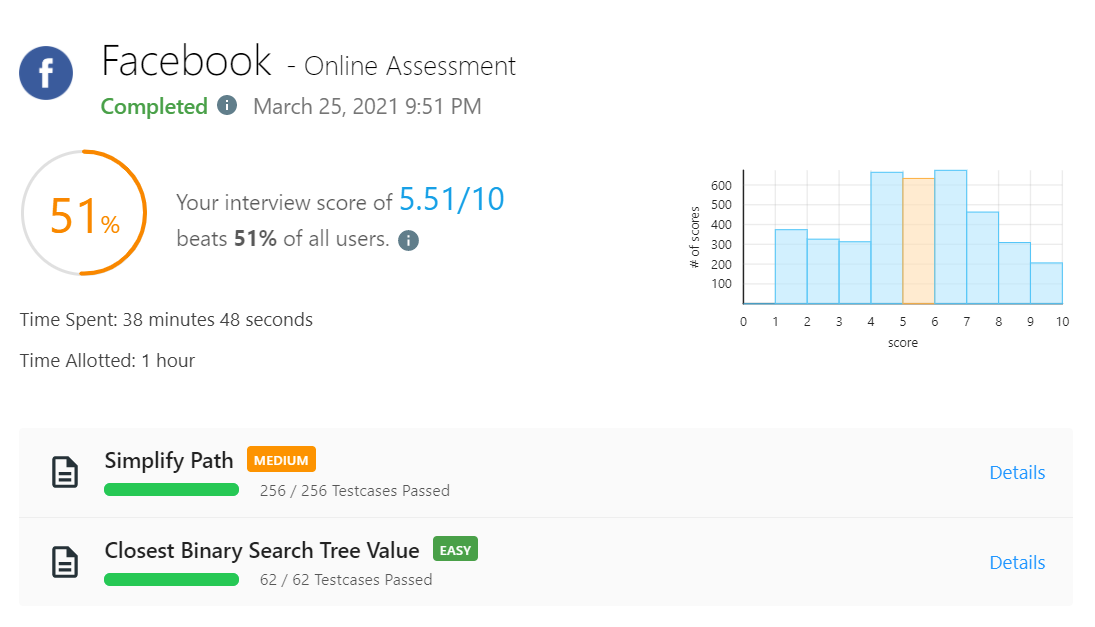
Simplify Path
class Solution {
public String simplifyPath(String path) {
String[] dir = path.split("/");
String result = "";
ArrayDeque<String> q = new ArrayDeque<String>();
for (int i = 0; i < dir.length; i++) {
if (dir[i].equals("..")) {
if (!q.isEmpty()) {
q.removeLast();
}
} else if (dir[i].equals(".")) {
continue;
} else if (dir[i].equals("")) {
continue;
} else {
q.addLast(dir[i]);
}
}
System.out.println(q);
if (q.isEmpty()) {
return "/";
}
while (! q.isEmpty()) {
result = result + "/" + q.removeFirst();
}
return result;
}
}Runtime: 10 ms, faster than 13.10% of Java online submissions for Simplify Path.
Memory Usage: 39.2 MB, less than 41.99% of Java online submissions for Simplify Path.
런타임 진심 핵구리다는점...^^
"/"로 split 하고 if statement 냅다 넣어
ArrayDeque가 생각나서 이걸 썼는데.. 스택 써서 POP도 가능하긴 합니다^^..하지만 그럼 끝에 reverse를 해야 한다는 점~~
Stringbuilder로 만드니깐
Runtime: 6 ms, faster than 43.58% of Java online submissions for Simplify Path.
Memory Usage: 39 MB, less than 55.12% of Java online submissions for Simplify Path.
훅 빨라지네요~~
거기에 stack까지 쓰면
Runtime: 3 ms, faster than 95.64% of Java online submissions for Simplify Path.
Memory Usage: 39.2 MB, less than 41.99% of Java online submissions for Simplify Path.
진짜 빨라진다는점
==> 루션이 보니깐 거꾸로 다 pop 한 후에 다시 거꾸로 붙이는게 아니라 그냥 for loop을 쓰면 앞에서 뒤로 가네요.. 완전 신기루
Closest Binary Search Tree Value
/**
* Definition for a binary tree node.
* public class TreeNode {
* int val;
* TreeNode left;
* TreeNode right;
* TreeNode() {}
* TreeNode(int val) { this.val = val; }
* TreeNode(int val, TreeNode left, TreeNode right) {
* this.val = val;
* this.left = left;
* this.right = right;
* }
* }
*/
class Solution {
public int closestValue(TreeNode root, double target) {
int curMax = root.val;
TreeNode cur = root;
while (cur != null) {
curMax = (Math.abs(target - (double) curMax) < Math.abs(target - (double) cur.val)) ? curMax : cur.val;
if (cur.val < target) {
cur = cur.right;
} else {
cur = cur.left;
}
}
return curMax;
}
}Runtime: 0 ms, faster than 100.00% of Java online submissions for Closest Binary Search Tree Value.
Memory Usage: 39.2 MB, less than 23.19% of Java online submissions for Closest Binary Search Tree Value.
크기 비교해서 가장 작은 숫자를 curMax로 잡아주고
treenode val을 원래 찾던 값과 비교해서 더 비슷한 쪽으로 찾아가는 방식
